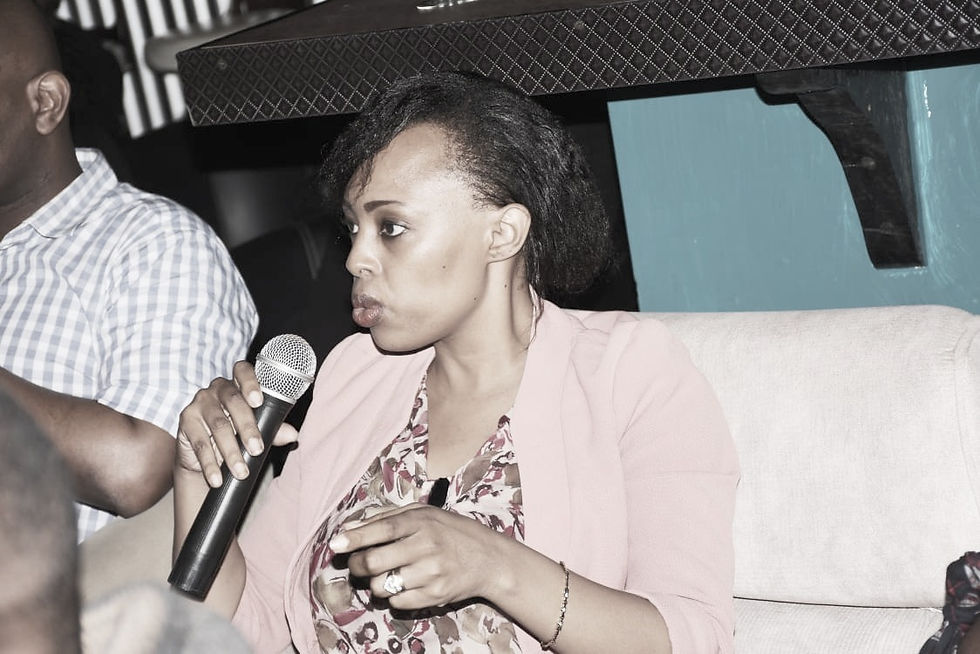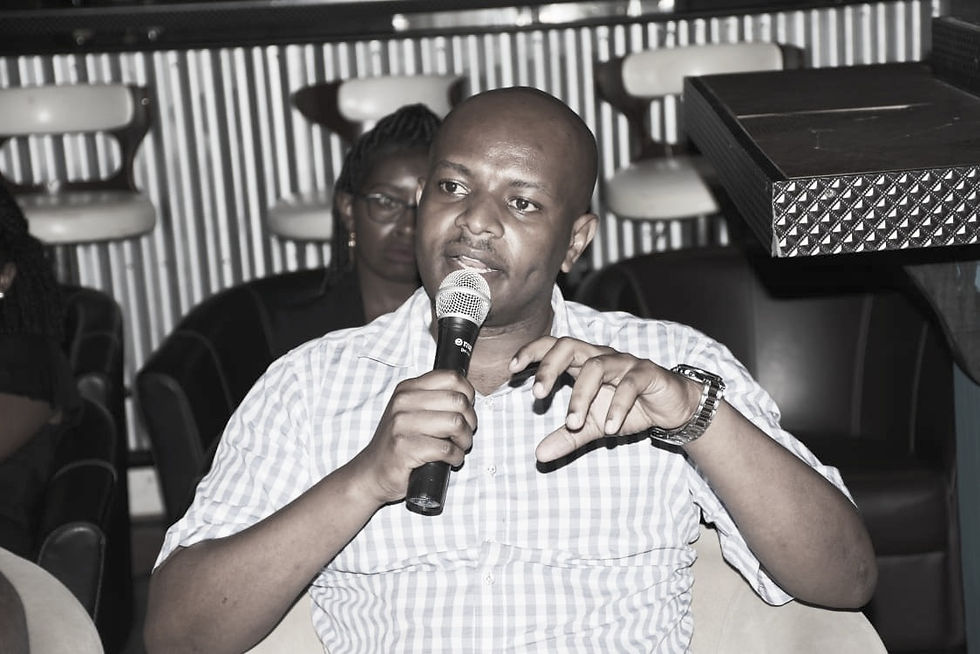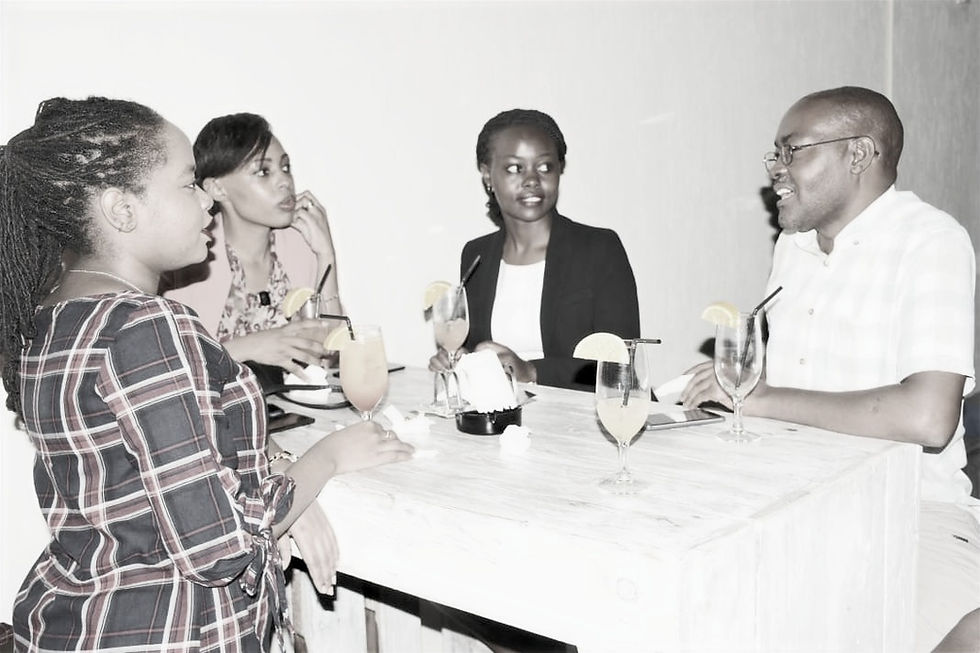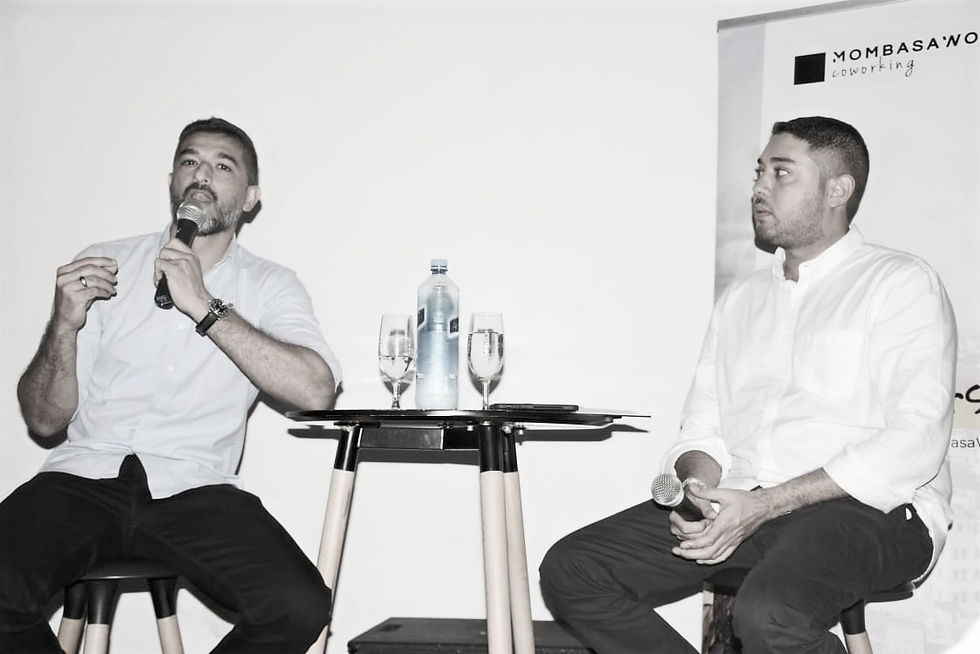"Make your own luck" | Founder no. 4
- Cindy Lithimbi-Ondego

- Jan 8, 2020
- 6 min read
Our 4th event in the series took place on Thursday 25 July. Our guest was Dr. Samier Murravej, dentist-turned-entrepreneur and alumnus of Aga Khan High School, Mombasa.

His latest venture is the Livia Dawa mobile application launched in 2016. But Samier has founded several other companies, including Pharmaken Ltd., a restaurant and a successful dental practice.
He was born and raised in Mombasa and attended Aga Khan High School, before attending the University of Nairobi. Samier got into dentistry after his brother fell down and broke 4 of his teeth, marking the beginning of what would amount to many hours in a dentist’s chair. Samier returned to Mombasa after university and opened up his private practice. Soon after, he began his foray into entrepreneurship with the launch of Pharmaken Ltd. and a decade later, Livia.
His businesses have a presence across the country so he travels a lot. But continues to build his businesses from here in Mombasa. Samier also continues to run his dentist practice in Mombasa. He told us he gets immense satisfaction from seeing people get better. More from our discussion below.
On contributing attributes
Despite entrepreneurship not having a universally accepted definition – some people limit it to pursuits in business, some argue it applies to solving any problem, some see it more as an organisation’s approach as opposed to its stage - almost every definition includes the taking of risk. From early on in our conversation, we learn that Samier is a risk taker. He quit his government job to open up his own dental practice. He opened up PharmaKen when his detail practice “wasn’t doing very well”; and took a personal loan to do so.
It’s also clear that Samier is the sort of entrepreneur that has it in his blood for finding solutions to problems in any organisation. He has been in the dentistry industry, the food and beverage industry, the construction industry, the tech industry, the pharmaceutical industry. Admittedly, he can’t sit still. But he doesn't come across as someone in disarray. To the contrary, he is extremely organised.
When asked who taught him to be a CEO, Samier said his father taught him how to be patient. And he has always been hungry to learn – from books, from people and from experiences. So, if we were to try and define this entrepreneur's attributes, we can say that he is a patient risk-taker who has a hunger to learn.
On self-awareness
Most entrepreneurs know their products inside out, but not all of them know themselves inside out.
Most entrepreneurs know their products inside out, but not all of them know themselves inside out. The one thing that stands out from listening to Samier, is how self-aware he is. As an entrepreneur you rarely have enough resources, notably money but also time. So our ability to know ourselves - our strengths and weaknesses, likes and dislikes, values etc. as well as be conscious of our actions and reactions – and then apply this to our business is both hard and essential at the same time.
How does this apply to business? It’s as simple as scheduling deep work when we know we are most creative and energised in the day, and leaving administrative tasks to when we are least alert. Or finding a co-founder who loves meeting people and who can sell you a leather jacket on a hot day in Mombasa, and can therefore make a great business development lead, because your strength is in proposal writing and financial modelling. Without self-awareness, we’re a boat without a rudder.

On Product Development
Samier ventured into food and beverage when he opened a restaurant a few years ago. It was a major fail. He went into this industry, in his own words, because of peer pressure. “Stick to what you are good at” is his lesson for us, and “don’t copy others, you don’t know what they went through.”
We spent a lot of time discussing product development, using Livia as a case study. A bit of background: Livia is an integrated health application comprising 5 platforms, for 5 different users (insurance companies, patients, distributors amongst others).
On one platform (aimed for patients) the app allows you to order over-the-counter medical drugs through a network of interconnected drug chemists and pharmacies. It works like this: you upload a picture of your prescription, which is then forwarded to chemists in your location; these chemists quote for the drugs within a short window. After a maximum of 12 minutes, you receive a push notification with the lowest price quotation. They have an in-house logistics arm that then delivers your order to you. More recently, they have enabled users to add their insurance details to their personal profiles and connect to local physicians.
There is so much more to this app than can be described here, but one that stands out is the ability to reduce the cost of medicine to end consumers.
Livia has been in the market 3 years now. It’s clear from our discussion that Samier still doesn’t think that his (or any) product can be perfect. A product needs to evolve with its customer. Which brings us to the discussion around knowing one’s customer. Knowing and understanding targeted customers is the overarching rule of exceptional startups. We had a fascinating discussion around the use of data and how really successful startups manage to know as well as change the behavior of their customers.
A big take away is the continuous investment in developing the Livia product, by learning and analyzing data and knowledge on its current client base. This applies to all products (and services) not just mobile applications. Of course, it helps if you are a perfectionist, like Samier.
It’s also really important to start as your mean to go, getting things right from the beginning. For Livia Dawa with a system for 5 different users and a global ambition, this means investing heavily in the app now. Samier has invested 30 times more than he initially planned to in order to integrate 5 platforms on one seam-less and easy-to-use application. We learn that a simple and easy to use front-end interface is much harder to achieve and takes a lot more time on the backend.

On Mombasa
All our guest Founders have deep experience and knowledge about doing business in Mombasa or the wider coast region. It's always interesting to hear their perspectives on the local economy. We talked about the tourism boom in the 80s, and early 90s; the logistics boom and its current decline. Samier steered clear of the current narratives focusing on exclusion, marginalization and political sabotage. His key message was that we must re-invent ourselves.
“The onus is on each and everyone to restore Mombasa to its former glory”
On leveraging
Leverage was Samier’s word of the day. We’ve all heard that we shouldn’t ask our friends, colleagues or mum for feedback about our product ideas, but we also know that once we eventually start, the very first ‘grant’ or ‘loan’ an entrepreneur will ever receive is going to be from family and friends. Perhaps this is why he is so deliberate about networking and meeting people.

Founding teams
This topic is always intriguing. But I’m beginning to see a pattern.
Past guests have describing finding co-founders like dating, others have found co-founders in spouses (some-times willing sometimes unwilling). Samier founded Pharmaken with 3 people he described as friends. They had clearly defined and distinct roles and areas of expertise; and they also each took personal bank loans to fund the business. Equal risk, equal opportunity, equal reward.
With Livia, he’s flying solo. He would’ve liked a co-founder though.
On success and seeing the big picture
You should be able to take a holiday - other you're not running a business, the business is running you
Samier doesn’t really see himself as having had one big high, perhaps only when his building was finally complete and the first tenant moved in. He’s more the type to celebrate the small goals reached as a way of enjoying the entire journey with its different stages.
Samier only spends half the day working on Livia. We asked him if he thinks it will it break even faster if he were to put more time into it. “3 more hours at Livia won’t make a difference now. It’s about critical mass as this stage,” he said.

On how to make your own luck
One of the last questions we always as at Founders, is whether our guest believes his/her success in entrepreneurship can be attributed most to luck or hard work? It has been really interesting to hear the different responses to this, particularly after our guests revealing so intimately various aspects of their character. We often try and guess beforehand what each founder will say.
Samier said 100% luck. But he then went on to say “can you make your own luck?” He described the importance of defining a clear vision; and the importance of networking. Samier described how he always seemed to get out of things just in the nick of time before they got worse, “the grace of God” he said. Or perhaps luck after all, depending on how you look at it.
We're so grateful to Samier for his time and generosity in sharing his story with us. And to Aaron for moderating the discussion. More summaries from previous Founders events can be found on the blog.





Comments